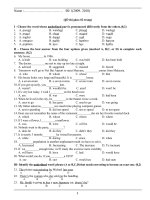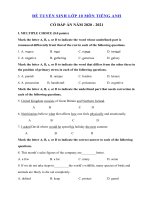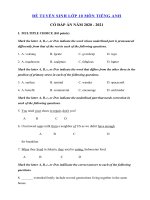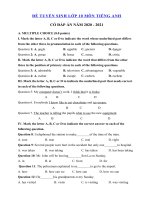Đề thi Tiếng Anh vào lớp 10 có đáp án chi tiết
Bạn đang xem bản rút gọn của tài liệu. Xem và tải ngay bản đầy đủ của tài liệu tại đây (137.82 KB, 6 trang )
PHÒNG GD&ĐT YÊN LẠC
ĐỀ THI THỬ VÀO LỚP 10 THPT NĂM 2017-2018
MÔN THI: TIẾNG ANH
Thời gian làm bài 60 phút, không kể thời gian giao đề
Đề thi này gồm 02 trang, Thí sinh làm bài ra tờ giấy thi.
Mã đề thi 017
PART A. PHẦN TRẮC NGHIỆM ( 8.0 points)
I. Choose the word A, B, C or D whose underlined part is pronounced differently from the others.
Câu 1: A. foreign
B. forest
C. honest
D. pollute
Câu 2: A. washed
B. crooked
C. cooked
D. looked
Câu 3: A. drip
B. wine
C. vinegar
D. shift
II. Choose the word A, B, C or D which is stressed differently from the others.
Câu 4: A. appliance
B. activity
C. average
D. adventure
Câu 5: A. limitation
B. reputation
C. inspiration
D. collection
III. Choose the option A, B, C or D which best completes each of the sentences.
Câu 6: “Why do you come here late?”, she asked me.
A. She asked me why I came there late.
B. She asked me why I come there late.
C. She asked me why I came here late.
D. She asked me why you came there late.
Câu 7: I look forward to________ from you.
A. to hear
B. hearing
C. hear
D. to hearing
Câu 8: This is the first time I ________the experiment on plants.
A. do
B. did
C. have done
D. would do
Câu 9: She said that she ________leave the city the following day.
A. had to
B. has to
C. would had to
D. would have to
Câu 10: ________ it was so windy and cold, she went out without a coat.
A. In spite of
B. Despite
C. Though
D. A and B are correct
Câu 11: We must wait ________Thursday for our final exam results.
A. by
B. until
C. after
D. later
Câu 12: My pen pal lives in the USA. We have ________for years but we haven’t met each other yet.
A. worked
B. corresponded
C. talked
D. written
Câu 13: The animals ________in iron cages are very dangerous.
A. keep
B. are kept
C. kept
D. are keep
Câu 14: Do you remember the name of the girl ________we met at the party last night?
A. which
B. whose
C. of whom
D. whom
Câu 15: When he was your age, he ________walk 5 kilometers to school every morning.
A. used to
B. uses to
C. was used to
D. used
Câu 16: I had ________to the countryside with my family last month.
A. two-days trip
B. a two-days trip
C. two-day trip
D. a two-day trip
Câu 17: ~ John: “Would you mind if I turned off the light?”
~ Mark: “________.”
A. Yes, I don’t mind
B. No, I wouldn’t
C. No, I don’t mind
D. Yes, I wouldn’t
Câu 18: I wish I ________play the piano as well as my close friend ________.
A. could/ do
B. could/ does
C. can/ does
D. can /do
Câu 19: My brother studied hard, ________he completed his exam successfully.
A. although
B. as
C. so
D. because
Câu 20: Ho Chi Minh City will ________temperatures between 27ºC and 33ºC tomorrow.
A. experience
B. arrive
C. reach
D. occur
Câu 21: You hardly watch science fiction films, _________?
A. do you
B. are you
C. aren’t you
D. don’t you
Câu 22: The new teacher loves poems and ________them by heart.
A. makes us to learn
B. make us learn
C. makes us learn
D. make us to learn
Câu 23: The ao dai used for men were different ________those for women.
A. from
B. with
C. to
D. for
Câu 24: ________is it from your house to the city center?
A. How often
B. How
C. Where
D. How far
Câu 25: In some countries, ________uniforms is compulsory in high schools.
A. wearing
B. to wear
C. wear
D. wore
IV. Read the following passage then choose the option A, B, C or D to fill in each of the blanks from 26 to 35.
LEARNING A SECOND LANGUAGE
Some people learn a second language (26) _________. Other people have trouble learning a new language. How can you help
(27) _________learn a new language, such as English? There are several ways to make learning English a little easier
and (28) _________.
The first step is to feel positive about learning English. If you believe that you can learn, you will learn. (29) _________patient.
You don’t have to understand (30) _________all at once. It’s natural to make mistakes when you learn something new. We can learn
from our mistakes.
The second step is to practice your English regularly. For example, write in the journal, or diary, everyday. You will get used to
(31) _________in English and you will feel more comfortable to express your ideas in English. After several weeks, you will see
that your writing is improving. (32) _________, you must speak English every day. You can practice with your classmates
(33) _________class.
The third step is to keep a record of your language learning. You can write this in your journal. After (34) _________class, think
about what you did. Did you answer a question (35) _________? Did you understand something the teacher explained? Perhaps the
lesson was difficult, but you tried to understand it.
It is important to practice every day and make a record of your achievements.
Câu 26: A. easilier
B. easy
C. ease
D. easily
Câu 27: A. youself
B. itself
C. herself
D. yourself
Câu 28: A. interesting
B. interested
C. more interesting
D. interester
Câu 29: A. Be
B. Been
C. Being
D. To be
Câu 30: A. something
B. everything
C. nothing
D. anything
Câu 31: A. to write
B. write
C. writing
D. written
Câu 32: A. Addition
B. In addition
C. By addition
D. Additional
Câu 33: A. out of
B. beside
C. next to
D. behind
Câu 34: A. some
B. each
C. few
D. all
Câu 35: A. correctly
B. correct
C. correction
D. corrective
V. Read the following passage then choose the option A, B, C or D to answer the questions from 36 to 40.
Britain is now a highly industrialized country and there are only 238,000 farms in the UK. More and more farmers leave the land
because they cannot earn enough money to survive. Only large farms are economic and because of this, most British farms are big.
They usually grow cereals in the east of England and raise sheep and cows in the north of England and Scotland. The small family
farms often have to earn more money by offering bed and breakfast accommodation to tourists.
Farming methods in Britain have also changed. Fields used to be quite small, divided by hedges which were sometimes a
thousand years old and full of wild flowers and birds. Many hedges were pulled up to allow farmers to use modern machinery. Now
most fields in England are large by European standards.
Câu 36: British farmers give up working on their farms because ________.
A. they don’t want to continue to live there
B. they can’t earn their own living by farming
C. they are forced to leave the land
D. they are bored of the farm work
Câu 37: Most British farms are big because ________.
A. most British farmers are rich
B. small farms are economic
C. there are plenty of abandoned land
D. farming is now industrialized
Câu 38: The small family farms often offer bed and breakfast accommodation to tourists ________.
A. to show their friendship
B. because they want to have more tourists to their farms
C. so as to improve their earnings
D. so that the tourists will return in their farm the next time
Câu 39: Fields on British farms used to be ________.
A. full of flowers grown by farmers
B. separated from each other by hedges
C. full of the tall plants
D. large forests
Câu 40: Which of the following sentences is NOT true?
A. Breeding farms are usually in the north of England.
B. Many hedges are pulled down for farmers to use modern machinery.
C. Most fields in England are now larger than they used to be.
D. Cereals are usually grown in the east of England and Scotland.
PART B. PHẦN TỰ LUẬN ( 2.0 points)
I. Complete the second sentence so that it has a similar meaning to the first one.
Câu 1: Everyday she spends two hours learning English.
Everyday it takes
Câu 2: It’s two years since I last spoke to her.
I haven’t
Câu 3: I can’t remember the answers to these questions.
If only
Câu 4: “who helped your brother yesterday?.” said Nam.
Nam wanted
Câu 5: Can’t you use this computer?
You can
?
II. Write a paragraph of 100-120 words about the benefits of learning foreign languages.
------------ HẾT ---------(Cán bộ coi thi không giải thích gì thêm)
Họ và tên:………………………………..………………SBD…….. phòng thi………………..
PHÒNG GD&ĐT YÊN LẠC
ĐỀ THI THỬ VÀO LỚP 10 THPT NĂM 2017-2018
MÔN THI: TIẾNG ANH
Thời gian làm bài 60 phút, không kể thời gian giao đề
Đề thi này gồm 02 trang, Thí sinh làm bài ra tờ giấy thi.
Mã đề thi 018
PART A. PHẦN TRẮC NGHIỆM ( 8.0 points)
I. Choose the word A, B, C or D which is stressed differently from the others.
Câu 1: A. appliance
B. cotton
C. average
D. baggy
Câu 2: A. champagne
B. blanket
C. exchange
D. collection
II. Choose the word A, B, C or D whose underlined part is pronounced differently from the others.
Câu 3: A. pollute
B. foreign
C. honest
D. forest
Câu 4: A. stopped
B. crooked
C. baked
D. looked
Câu 5: A. widely
B. wine
C. vinegar
D. violent
III. Read the following passage then choose the option A, B, C or D to fill in each of the blanks from 26 to 35.
LEARNING A SECOND LANGUAGE
Some people learn a second language (6) _________. Other people have trouble learning a new language. How can you help (7)
_________learn a new language, such as English? There are several ways to make learning English a little easier and (8)
_________.
The first step is to feel positive about learning English. If you believe that you can learn, you will learn. (9) _________patient.
You don’t have to understand (10) _________all at once. It’s natural to make mistakes when you learn something new. We can learn
from our mistakes.
The second step is to practice your English regularly. For example, write in the journal, or diary, everyday. You will get used to
(11) _________in English and you will feel more comfortable to express your ideas in English. After several weeks, you will see
that your writing is improving. (12) _________, you must speak English every day. You can practice with your classmates (13)
_________class.
The third step is to keep a record of your language learning. You can write this in your journal. After (14) _________class, think
about what you did. Did you answer a question (15) _________? Did you understand something the teacher explained? Perhaps the
lesson was difficult, but you tried to understand it.
It is important to practice every day and make a record of your achievements.
Câu 6: A. easilier
B. easily
C. ease
D. easy
Câu 7: A. yourself
B. himself
C. herself
D. youself
Câu 8: A. more interesting
B. interested
C. interesting
D. interester
Câu 9: A. Being
B. Been
C. Be
D. To be
Câu 10: A. something
B. everything
C. nothing
D. anything
Câu 11: A. written
B. write
C. to write
D. writing
Câu 12: A. Addition
B. By addition
C. In addition
D. Additional
Câu 13: A. out of
B. beside
C. next to
D. behind
Câu 14: A. some
B. all
C. few
D. each
Câu 15: A. correct
B. correctly
C. correction
D. corrective
IV. Choose the option A, B, C or D which best completes each of the sentences.
Câu 16: “Why do you come here late?”, she asked me.
A. She asked me why I came here late.
B. She asked me why I come there late.
C. She asked me why I came there late.
D. She asked me why you came there late.
Câu 17: I look forward to________ from you.
A. to hear
B. to hearing
C. heard
D. hearing
Câu 18: This is the first time I ________the experiment on plants.
A. have done
B. did
C. do
D. would do
Câu 19: She said that she ________leave the city the following day.
A. had to
B. has to
C. would have to D. would has to
Câu 20: ________ it was so windy and cold, she went out without a coat.
A. In spite of
B. Though
C. Despite
D. A and B are correct
Câu 21: We must wait ________Thursday for our final exam results.
A. by
B. until
C. after
D. later
Câu 22: My pen pal lives in the USA. We have ________for years but we haven’t met each other yet.
A. talked
B. corresponded
C. worked
D. written
Câu 23: The animals ________in iron cages are very dangerous.
A. keep
B. are kept
C. are keep
D. kept
Câu 24: Do you remember the name of the girl ________we met at the party last night?
A. which
B. whose
C. whom
D. of whom
Câu 25: When he was your age, he ________walk 5 kilometers to school every morning.
A. used to
B. uses to
C. was used to
D. used
Câu 26: I had ________to the countryside with my family last month.
A. two-days trip
B. a two-days trip
C. a two-day trip
D. two-day trip
Câu 27: ~ John: “Would you mind if I turned off the light?”
~ Mark: “________.”
A. No, I don’t mind
B. No, I wouldn’t
C. Yes, I don’t mind
D. Yes, I wouldn’t
Câu 28: I wish I ________play the piano as well as my close friend ________.
A. could/ does
B. could/ do
C. can/ does
D. can /do
Câu 29: My brother studied hard, ________he completed his exam successfully.
A. although
B. as
C. so
D. because
Câu 30: Ho Chi Minh City will ________temperatures between 27ºC and 33ºC tomorrow.
A. occur
B. arrive
C. reach
D. experience
Câu 31: You hardly watch science fiction films, _________?
A. don’t you
B. are you
C. aren’t you
D. do you
Câu 32: The new teacher loves poems and ________them by heart.
A. makes us to learn
B. make us learn
C. makes us learn
D. make us to learn
Câu 33: The ao dai used for men were different ________those for women.
A. from
B. with
C. to
D. for
Câu 34: ________is it from your house to the city center?
A. How often
B. How far
C. Where
D. How
Câu 35: In some countries, ________uniforms is compulsory in high schools.
A. to wear
B. wearing
C. wear
D. wore
V. Read the following passage then choose the option A, B, C or D to answer the questions from 36 to 40.
Britain is now a highly industrialized country and there are only 238,000 farms in the UK. More and more farmers leave the land
because they cannot earn enough money to survive. Only large farms are economic and because of this, most British farms are big.
They usually grow cereals in the east of England and raise sheep and cows in the north of England and Scotland. The small family
farms often have to earn more money by offering bed and breakfast accommodation to tourists.
Farming methods in Britain have also changed. Fields used to be quite small, divided by hedges which were sometimes a
thousand years old and full of wild flowers and birds. Many hedges were pulled up to allow farmers to use modern machinery. Now
most fields in England are large by European standards.
Câu 36: British farmers give up working on their farms because ________.
A. they don’t want to continue to live there
B. they are forced to leave the land
C. they can’t earn their own living by farming
D. they are bored of the farm work
Câu 37: Most British farms are big because ________.
A. most British farmers are rich
B. farming is now industrialized
C. there are plenty of abandoned land
D. small farms are economic
Câu 38: The small family farms often offer bed and breakfast accommodation to tourists ________.
A. to show their friendship
B. because they want to have more tourists to their farms
C. so that the tourists will return in their farm the next time
D. so as to improve their earnings
Câu 39: Fields on British farms used to be ________.
A. large forests
B. full of flowers grown by farmers
C. full of the tall plants
D. separated from each other by hedges
Câu 40: Which of the following sentences is NOT true?
A. Cereals are usually grown in the east of England and Scotland.
B. Many hedges are pulled down for farmers to use modern machinery.
C. Most fields in England are now larger than they used to be.
D. Breeding farms are usually in the north of England.
PART B. PHẦN TỰ LUẬN ( 2.0 points)
I. Complete the second sentence so that it has a similar meaning to the first one.
Câu 1: “You should plant some trees around your house, Hoa.” Lan said.
Lan suggested
Câu 2: They have to feed these cats twice a day.
These cats
Câu 3: I don’t know her address and phone number.
If only
Câu 4: “who did your brother help yesterday?.” said Nam.
Nam wanted
Câu 5: Can you speak English fluently?
You can
?
II. Write a paragraph of 100-120 words about the benefits of learning foreign languages.
------------ HẾT ---------(Cán bộ coi thi không giải thích gì thêm)
Họ và tên:………………………………..………………SBD…….. phòng thi………………..
HƯỚNG DẪN CHẤM MÔN: TIẾNG ANH
MÃ ĐỀ 017
PHẦN TRẮC NGHIỆM (40 câu: 8,0 điểm; 0,2 điểm cho mỗi đáp án đúng)
1. D
11. B
21. A
31. C
2. B
12. B
22. C
32. B
3. B
13. C
23. A
33. A
4. C
14. D
24. D
34. B
5. D
15. A
25. A
35. A
6. A
16. D
26. D
36. B
7. B
17. C
27. D
37. D
8. C
18. B
28. C
38. C
9. D
19. C
29. A
39. B
10. C
20. A
30. B
40. D
PHẦN TỰ LUẬN (2,0 điểm)
.
I. SENTENCE TRANSFORMATION:
Complete each of the following sentences in such a way that it means exactly the same as the one
printed before it. (0,5 điểm; 0,1 điểm cho mỗi đáp án đúng)
Câu 1. Every day It takes her two hours to learn English.
Câu 2. I haven’t spoken to her for two years.
Câu 3. If only I could remember the answers to these questions.
Câu 4. Nam wanted to know who helped/( had helped) my brother the previous day/( the day before).
Câu 5. You can not use this computer, can you?.
II. PARAGRAPH WRITING:
1
2
3
4
5
Mô tả tiêu chí đánh giá
Bố cục
o Câu đề dẫn chủ đề mạch lạc
o Bố cục hợp lí rõ ràng phù hợp yêu cầu của đề bài
o Bố cục uyển chuyển từ mở bài đến kết luận
Phát triển ý
o Phát triển ý có trình tự logic
o Có dẫn chứng, ví dụ, … đủ để bảo vệ ý kiến của mình
Sử dụng ngôn từ
o Sử dụng ngôn từ phù hợp nội dung
o Sử dụng ngôn từ đúng văn phong/ thể loại
o Sử dụng từ nối các ý cho bài viết uyển chuyển
Nội dung
o Đủ thuyết phục người đọc
o Đủ dẫn chứng, ví dụ, lập luận
o Độ dài: Số từ không nhiều hơn hoặc ít hơn so với quy định 5%
Ngữ pháp, dấu câu, và chính tả
o Sử dụng đúng dấu câu.
o Viết đúng chính tả.
o Sử dụng đúng thời, thể, cấu trúc câu đúng ngữ pháp.
Điểm tối đa
0,3
0,3
0,3
0,3
0,3
Tổng
1,5
MÃ ĐỀ 018
PHẦN TRẮC NGHIỆM (40 câu: 8,0 điểm; 0,2 điểm cho mỗi đáp án đúng)
1.
11.
21.
31.
.
A
D
B
D
2.
12.
22.
32.
B
C
B
C
3.
13.
23.
33.
A
A
D
A
4.
14.
24.
34.
B
D
C
B
5.
15.
25.
35.
C
B
A
B
6.
16.
26.
36.
B
C
C
C
7.
17.
27.
37.
A
D
A
B
8.
18.
28.
38.
A
A
A
D
9.
19.
29.
39.
C
C
C
D
10.
20.
30.
40.
B
B
D
A
B. PHẦN TỰ LUẬN (2,0 điểm)
I. SENTENCE TRANSFORMATION:
Complete each of the following sentences in such a way that it means exactly the same as the one
printed before it. (0,5 điểm; 0,1 điểm cho mỗi đáp án đúng)
Câu 1. Lan suggested (that) Hoa (should) plant some trees around her house.
Câu 2. These cats have to be fed twice a day.
Câu 3. If only I knew her address and phone number.
Câu 4. Nam wanted to know who my brother helped// (had helped) the previous day//( the day before).
Câu 5. You can speak English fluently, can’t you?
II. PARAGRAPH WRITING:
1
2
3
4
5
Mô tả tiêu chí đánh giá
Bố cục
o Câu đề dẫn chủ đề mạch lạc
o Bố cục hợp lí rõ ràng phù hợp yêu cầu của đề bài
o Bố cục uyển chuyển từ mở bài đến kết luận
Phát triển ý
o Phát triển ý có trình tự logic
o Có dẫn chứng, ví dụ, … đủ để bảo vệ ý kiến của mình
Sử dụng ngôn từ
o Sử dụng ngôn từ phù hợp nội dung
o Sử dụng ngôn từ đúng văn phong/ thể loại
o Sử dụng từ nối các ý cho bài viết uyển chuyển
Nội dung
o Đủ thuyết phục người đọc
o Đủ dẫn chứng, ví dụ, lập luận
o Độ dài: Số từ không nhiều hơn hoặc ít hơn so với quy định 5%
Ngữ pháp, dấu câu, và chính tả
o Sử dụng đúng dấu câu.
o Viết đúng chính tả.
o Sử dụng đúng thời, thể, cấu trúc câu đúng ngữ pháp.
Điểm tối đa
0,3
0,3
0,3
0,3
0,3
Tổng
1,5



![Đột phá Tiếng Anh điểm 9+ - Bộ đề thi Tiếng Anh vào lớp 10 (có đáp án) [bản Word]](https://media.store123doc.com/images/document/2020_06/12/medium_ljt1591845266.jpg)





